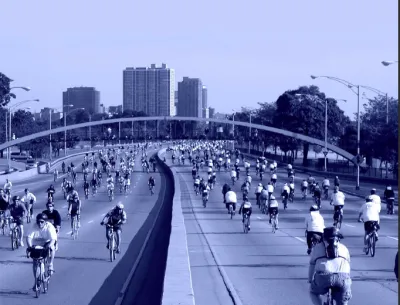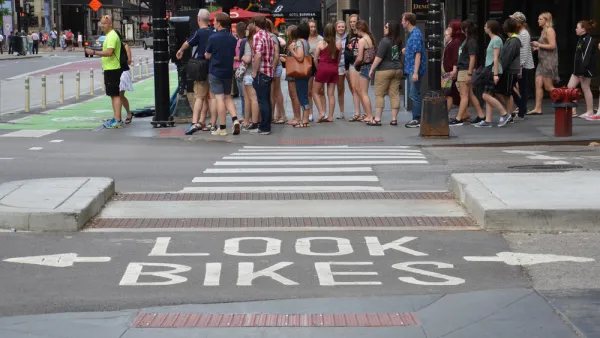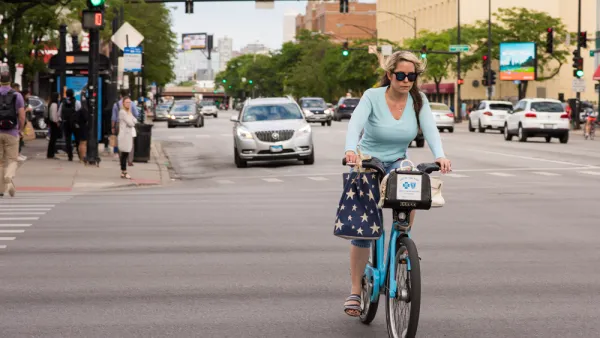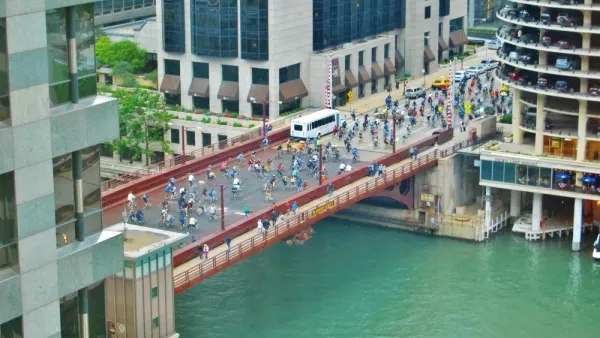The city, which has been slow to implement complete streets initiatives during the pandemic, promises closer collaboration with community groups to advance equity in transportation.

In a year when many cities used the pandemic as an opportunity to rethink public space and implement ambitious initiatives to improve walking and biking infrastructure, writes Courtney Courtney Cobbs, Chicago's progress on similar projects has been disappointingly slow. However, Cobbs hopes that a renewed focus on mobility justice and equity in the Chicago Department of Transportation (CDOT)'s Complete Streets division shows promise for the future of transportation equity in the city.
Although the agency suspended their quarterly bicycle and pedestrian advisory council meetings last year, a notice sent out in September announced CDOT's plans for a Transportation Equity Network to "develop closer relationships with communities and long-term strategies for mobility justice." To make walking and biking safe and accessible for Chicago's most vulnerable communities, Cobbs argues, the agency has to "make a concerted effort to increase the representation of women, gender-nonconforming individuals, Black and Brown folks, people with disabilities, and other marginalized people whose mobility needs have not been centered in previous transportation decisions" as well as decrease the power that car owners and individual aldermen have over the city's land use and transportation decisions. "Part of ensuring [transportation equity] means making sure the community engagement process centers those who have been missing from the decision-making process."
The Transportation Equity Network is one of two significant equity plans to focus on transportation in recent months. The city also released an Equitable Transit-Oriented Development policy plan in September 2020.
FULL STORY: Will CDOT’s new strategic plan be a turning point for equitable transportation?

Analysis: Cybertruck Fatality Rate Far Exceeds That of Ford Pinto
The Tesla Cybertruck was recalled seven times last year.

National Parks Layoffs Will Cause Communities to Lose Billions
Thousands of essential park workers were laid off this week, just before the busy spring break season.

Retro-silient?: America’s First “Eco-burb,” The Woodlands Turns 50
A master-planned community north of Houston offers lessons on green infrastructure and resilient design, but falls short of its founder’s lofty affordability and walkability goals.

Test News Post 1
This is a summary

Analysis: Cybertruck Fatality Rate Far Exceeds That of Ford Pinto
The Tesla Cybertruck was recalled seven times last year.

Test News Headline 46
Test for the image on the front page.
Urban Design for Planners 1: Software Tools
This six-course series explores essential urban design concepts using open source software and equips planners with the tools they need to participate fully in the urban design process.
Planning for Universal Design
Learn the tools for implementing Universal Design in planning regulations.
EMC Planning Group, Inc.
Planetizen
Planetizen
Mpact (formerly Rail~Volution)
Great Falls Development Authority, Inc.
HUDs Office of Policy Development and Research
NYU Wagner Graduate School of Public Service




























